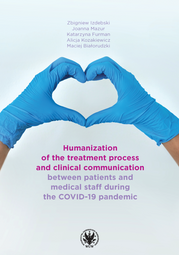Informacje o publikacji
O publikacji
Fragmenty
Dodatki
Dodatki
Recenzje
Bibliografia
O publikacji
| Wydanie: | 1 |
| Miejsce i rok wydania: | Warszawa 2023 |
| Język publikacji: | angielski |
| ISBN/ISSN: | 978-83-235-6018-0 |
| EAN: | 9788323560180 |
| Liczba stron: | 240 |
| Sposób publikacji: | PDF |
| Wielkość pliku: | 20,16 MB |
| Typ publikacji: | Praca naukowa , Open access |
| DOI: | https://doi.org/10.31338/uw.9788323560180 |
This report is based on research conducted under a grant from Poland’s Medical Research Agency, carried out at the University of Warsaw from May 2021 to June 2023. Preliminary findings were presented at the First Congress on the Humanization of Medicine held at the University of Warsaw in June 2022, organized by the Polish Ministry of Health, the Medical Research Agency, and the University of Warsaw.
The survey results presented herein concern four different groups of healthcare employees (physicians, nurses, paramedics, and representatives of other medical and non-medical professions) working at 114 health care units located across the country, a sample of patients at the same medical units, as well as a separate population-based sample of patients from across Poland (individuals who had received medical treatment in the last 24 months).
The publication is licensed under the Creative Commons Attribution-Share Alike 3.0 Poland license (CC BY 3.0 PL) (full license available at: https://creativecommons.org/licenses/by/3.0/legalcode).
******
Humanizacja procesu leczenia i komunikacja kliniczna pomiędzy pacjentem a personelem medycznym w czasie pandemii COVID-19
Raport powstał w ramach grantu Agencji Badań Medycznych realizowanego na Uniwersytecie Warszawskim od maja 2021 do czerwca 2023 roku. Wstępne wyniki badań przedstawiono na I Kongresie Humanizacji Medycyny w czerwcu 2022 roku, zorganizowanego na Uniwersytecie Warszawskim przez Ministerstwo Zdrowia, Agencję Badań Medycznych i UW.
Wyniki prezentowane w tej publikacji dotyczą czterech różniących się liczebnością grup pracowników (lekarzy, pielęgniarek, ratowników medycznych oraz przedstawicieli innych zawodów medycznych i niemedycznych) ze 114 jednostek ochrony zdrowia zlokalizowanych w całym kraju, a także pacjentów z tych samych jednostek medycznych oraz pacjentów z próby populacyjnej (osób leczących się w ostatnich 24 miesiącach). Opisując wyniki, wybrano tematy najważniejsze z punktu widzenia dyskusji nad humanizacją medycyny, silnie akcentując kontekst pandemii COVID-19.
Publikacja na licencji Creative Commons Uznanie autorstwa 3.0 PL (CC BY 3.0 PL) (pełna treść wzorca dostępna pod adresem: http://creativecommons.org/licenses/by/3.0/pl/legalcode).

The survey results presented herein concern four different groups of healthcare employees (physicians, nurses, paramedics, and representatives of other medical and non-medical professions) working at 114 health care units located across the country, a sample of patients at the same medical units, as well as a separate population-based sample of patients from across Poland (individuals who had received medical treatment in the last 24 months).
The publication is licensed under the Creative Commons Attribution-Share Alike 3.0 Poland license (CC BY 3.0 PL) (full license available at: https://creativecommons.org/licenses/by/3.0/legalcode).
******
Humanizacja procesu leczenia i komunikacja kliniczna pomiędzy pacjentem a personelem medycznym w czasie pandemii COVID-19
Raport powstał w ramach grantu Agencji Badań Medycznych realizowanego na Uniwersytecie Warszawskim od maja 2021 do czerwca 2023 roku. Wstępne wyniki badań przedstawiono na I Kongresie Humanizacji Medycyny w czerwcu 2022 roku, zorganizowanego na Uniwersytecie Warszawskim przez Ministerstwo Zdrowia, Agencję Badań Medycznych i UW.
Wyniki prezentowane w tej publikacji dotyczą czterech różniących się liczebnością grup pracowników (lekarzy, pielęgniarek, ratowników medycznych oraz przedstawicieli innych zawodów medycznych i niemedycznych) ze 114 jednostek ochrony zdrowia zlokalizowanych w całym kraju, a także pacjentów z tych samych jednostek medycznych oraz pacjentów z próby populacyjnej (osób leczących się w ostatnich 24 miesiącach). Opisując wyniki, wybrano tematy najważniejsze z punktu widzenia dyskusji nad humanizacją medycyny, silnie akcentując kontekst pandemii COVID-19.
Publikacja na licencji Creative Commons Uznanie autorstwa 3.0 PL (CC BY 3.0 PL) (pełna treść wzorca dostępna pod adresem: http://creativecommons.org/licenses/by/3.0/pl/legalcode).

Recenzje
O autorze
Bibliografia
Fragmenty
Dodatki
Dodatki

























